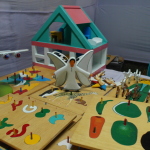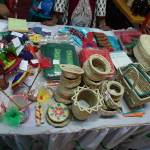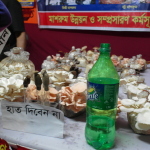All the usual suspects are here, at the disability fair. Outside I meet some NGO/charity types that I know. Walking in, a colleague in government greets me. Before long, I’m talking with some disabled people, too. Everyone’s here, for a week-long celebration starting on the International Day of People with Disability. The field of the government’s disability foundation has been repurposed to have stalls around the outside.

The Bangladesh Tourism Board is promoting travel of disabled people? Brilliant.
It’s very exciting to begin with as I see my old friends and make new ones. I test out the few pieces of Bangla sign-language I know, and sit in the stall of the government factory that makes plastic products and bottles water (one the buyers of the water they produce is the Prime Minister’s Office).
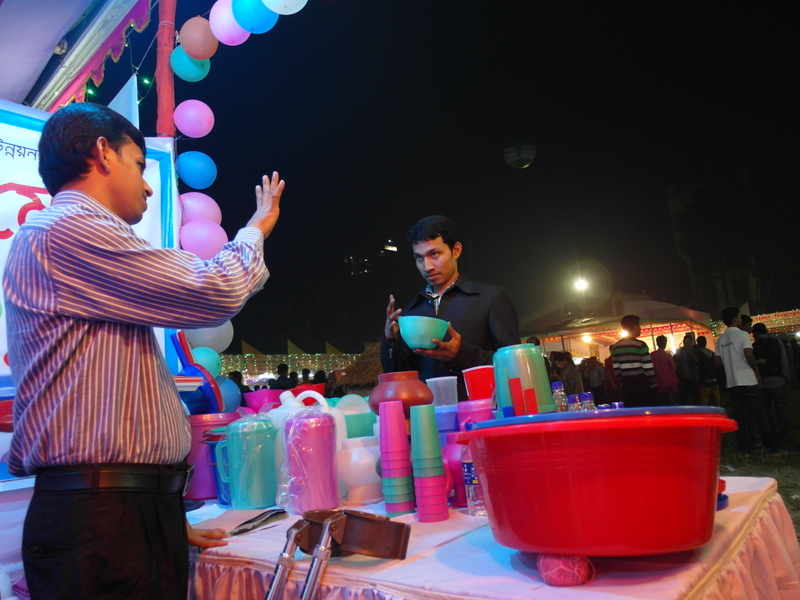
Bargaining using sign-language.
Maitri Shilpa is a factory staffed by people with physical and hearing disabilities.
My friends and previous colleagues at HI Bangladesh put up a big poster on why “Inclusive Community” = “Removing Barriers” + “Support Services”. They also brought a scale model of a wheel-chair accessible shop.
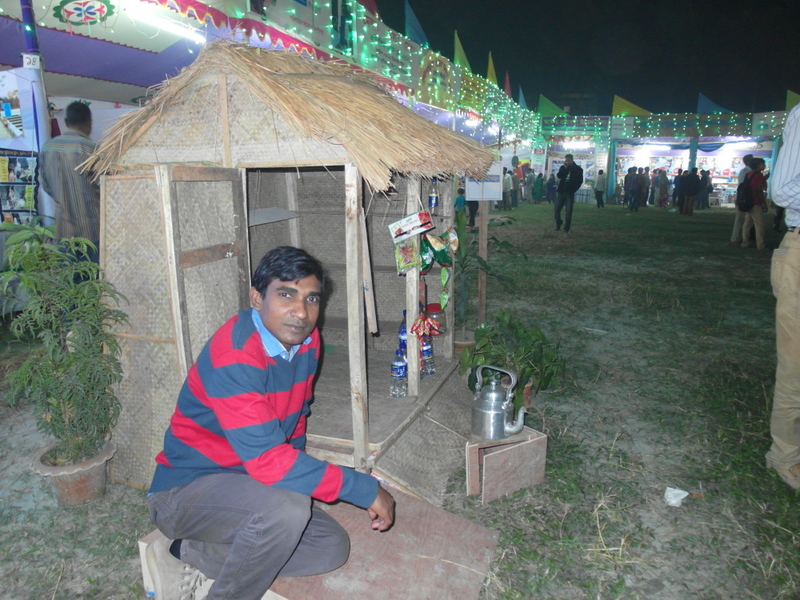
This is a model of a small village shop that a wheelchair user could get into and sell biscuits/chips/tea from.
Next door I pop into the disability foundation’s own stall. Here they have some medical equipment, and appear to have a room where they are actually seeing people. “What therapy can I get?” I say, as a joke. They take me seriously, ask where I live and discuss which center is closest to my house. “What problem do you have?” asks a kind lady. “I don’t have any problem,” I say abruptly, limping away.
Actually I do have a problem. My problem is that I’m so obsessed with showing the social side of disability that I sometimes find the treatment of it as a medical condition quite unsettling. I know that I need therapy, and I know lots of people here are in serious difficulties because they don’t get health or rehabilitation support in good quality.

The Center for Disability and Development showcases assistive devices.
This is the thing about the faces of disability in Bangladesh. All the different ways you can understand disability are present, whether from the point of view of a medical problem, or something that results from social barriers, or something connected with moral worth. This big wheelchair is in front of the stall of an organisation that can explain the social model of disability very well.
The main theme of the stalls though, was handicrafts. All the organisations that could had products “made by disabled people”. Bags, wooden puzzles, plastic cups, clothes, mushrooms, decorations, clocks, etcetara.
There were quite a few schools for disabled children as well. Mostly they seemed to be for children for intellectual impairments. There are schools for children with hearing impairments, but I didn’t see them at the fair.
By the time I’d gotten round all of the organisations I wasn’t sure whether I’d gone backward or forward. I wasn’t sure whether we were talking about empowerment of disabled people, the treatment and cure of disabled people, segregation of disabled people into special schools, the wonderful talents of disabled people (and children) to make handicrafts, or what. In some way we were talking about all of these things at once, which is one of the reasons why working on disability here is so fun and so messy. On the one hand all the handicrafts started to feel quite stereotyped. On the other hand, some of these handicraft stalls were looked after by disabled people who seemed pretty empowered to be there.
One of the stalls apologised to me that they didn’t have anything to show or sell but for a book and a CD. I was quite relieved that I wasn’t seeing more handicrafts. A friend pointed excitedly towards the sign they had made and urgently put a leaflet into my hand.
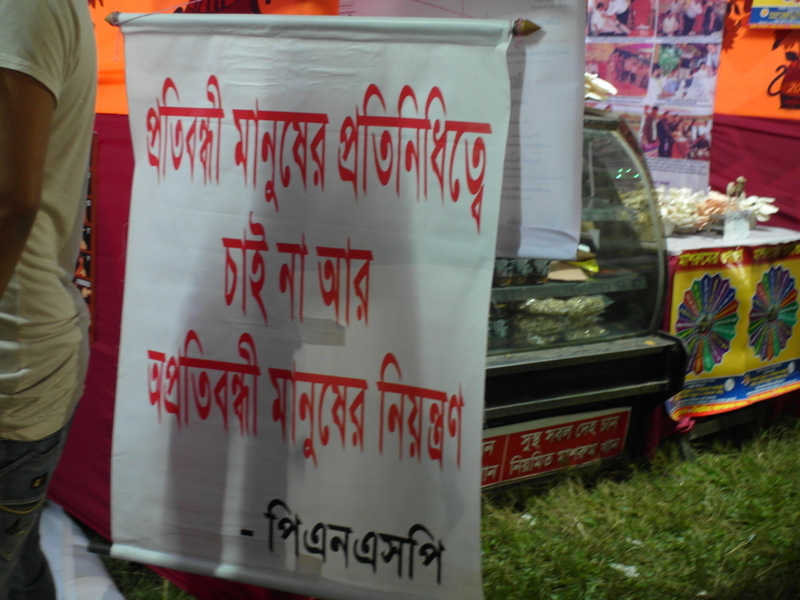
PNSP is the latest DPO federation in town.
You can see the neighbouring mushroom-stall in the background. But this organisation has other ideas. The sign reads “We don’t want the representation of disabled people to be in the control of non-disabled people”. The leaflet is densely written, but has a simple title and direct text:
We want to take our decisions
The idea of most people in this country is that disabled people cannot do their own work. That disabled people are dependent on others to survive. And in decision-making, there is no question of their participation. As a result, non-disabled people are controlling the lives of disabled people.
That’s my translation of the beginning of two pages of this tightly written Bangla. It’s clear that in part this is a protest against some of their colleagues present in other stalls at the fair. I wouldn’t put it so strongly myself, but I completely agree on wanting disabled people to be able to make their own decisions. Are health services, assistive devices, handicrafts and self-determination going hand-in-hand towards the same goal? This fair brought us all together, but I wonder what differences there are among us.
